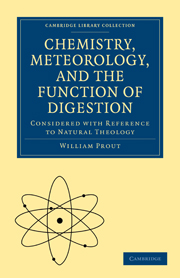Book contents
- Frontmatter
- TO THE READER [FIRST EDITION]
- TO THE READER [SECOND EDITION]
- Contents
- Dedication
- INTRODUCTION
- BOOK I OF CHEMISTRY
- BOOK II OF METEOROLOGY
- BOOK III OF THE CHEMISTRY OF ORGANIZATION
- CHAPTER I OF THE NATURE AND COMPOSITION OF ORGANIZED BODIES IN GENERAL, AS COMPARED WITH INORGANIC MATTER
- CHAPTER II OF THE MODES OF NUTRITION; COMPREHENDING A SKETCH OF THE ALIMENTARY APPARATUS; AND OF ALIMENTARY SUBSTANCES IN PLANTS AND IN ANIMALS
- CHAPTER III OF THE DIGESTIVE PROCESS; AND OF THE GENERAL ACTION OF THE STOMACH AND THE DUODENUM
- CHAPTER IV OF THE PROCESSES OF ASSIMILATION SUBSEQUENT TO THOSE IN THE STOMACH AND ALIMENTARY CANAL; PARTICULARLY OF THE CONVERSION OF THE CHYLE INTO BLOOD. OF RESPIRATION AND ITS USES. OF SECRETION. OF THE FINAL DECOMPOSITION OF ORGANIZED BODIES. GENERAL REFLECTIONS AND CONCLUSION
- APPENDIX
CHAPTER I - OF THE NATURE AND COMPOSITION OF ORGANIZED BODIES IN GENERAL, AS COMPARED WITH INORGANIC MATTER
Published online by Cambridge University Press: 29 August 2010
- Frontmatter
- TO THE READER [FIRST EDITION]
- TO THE READER [SECOND EDITION]
- Contents
- Dedication
- INTRODUCTION
- BOOK I OF CHEMISTRY
- BOOK II OF METEOROLOGY
- BOOK III OF THE CHEMISTRY OF ORGANIZATION
- CHAPTER I OF THE NATURE AND COMPOSITION OF ORGANIZED BODIES IN GENERAL, AS COMPARED WITH INORGANIC MATTER
- CHAPTER II OF THE MODES OF NUTRITION; COMPREHENDING A SKETCH OF THE ALIMENTARY APPARATUS; AND OF ALIMENTARY SUBSTANCES IN PLANTS AND IN ANIMALS
- CHAPTER III OF THE DIGESTIVE PROCESS; AND OF THE GENERAL ACTION OF THE STOMACH AND THE DUODENUM
- CHAPTER IV OF THE PROCESSES OF ASSIMILATION SUBSEQUENT TO THOSE IN THE STOMACH AND ALIMENTARY CANAL; PARTICULARLY OF THE CONVERSION OF THE CHYLE INTO BLOOD. OF RESPIRATION AND ITS USES. OF SECRETION. OF THE FINAL DECOMPOSITION OF ORGANIZED BODIES. GENERAL REFLECTIONS AND CONCLUSION
- APPENDIX
Summary
"A LIVING being considered as an object of chemical research, is a laboratory, within which a number of chemical operations are conducted; of these operations, one chief object is to produce all those phenomena, which taken collectively are denominated Life; while another chief object is to develope gradually the corporeal machine or Laboratory itself, from its existence in the condition of an atom, as it were, to its utmost state of perfection. From this point of utmost perfection, the whole begins to decline as gradually as it had been developed; the operations are performed in a manner less and less perfect, till at length the being ceases to live; and the elements of which it is composed, again set free, obey the general laws of inorganic nature." Such is the history of organic existence; nor, though the periods of developement and of decay be infinitely varied in different species, does a single individual remain for a moment stationary; but all, sooner or later, transcend their prime, and finally share the common lot of dissolution.
- Type
- Chapter
- Information
- Chemistry, Meteorology and the Function of Digestion Considered with Reference to Natural Theology , pp. 417 - 446Publisher: Cambridge University PressPrint publication year: 2009First published in: 1834



